|
|
|
Sort Order |
|
|
|
Items / Page
|
|
|
|
|
|
|
| Srl | Item |
| 1 |
ID:
123032


|
|
|
| 2 |
ID:
095405
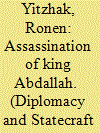

|
|
|
|
|
| Publication |
2010.
|
| Summary/Abstract |
King Abdallah was assassinated as a result of his relationship with Arab leaders. The opposition included three leaders: the Mufti Hajj Amin al-Huseini, King Faruq and Ibn Saud. Jordanian intelligence knew about the conspiracy and warned King Abdallah, but he decided to visit Jerusalem as originally planned and there he was assassinated. After the assassination on 20 July 1951, the Jordanian government was faced with two dangers that threatened the Hashemite regime in Jordan. The first, a Palestinian rebellion the purpose of which was the replacement of the Hashemite regime with a Palestinian one; the second an invasion of Jordan by either Syria or Saudi Arabia or both countries together, and their possible control of it. However, the dangers turned out to be neither tangible nor serious and the Hashemite regime remained in power.
|
|
|
|
|
|
|
|
|
|
|
|
|
|
|
|
| 3 |
ID:
057754
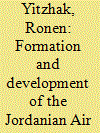

|
|
|
| 4 |
ID:
099126


|
|
|
| 5 |
ID:
188644


|
|
|
|
|
| Summary/Abstract |
The article discusses the relations between Arab nationalists and Amīr Abdullah in the Emirate of Trans-Jordan in the crucial period from 1921–1924. The first connections between the two arose due to the desire of the Arab nationalists to realize their ambition of throwing the French out of Syria and establishing an Arab government there instead. The nationalists thought that they would be able to achieve their goals through Abdullah, who had come to Trans-Jordan from Hejāz. Thus, they supported, encouraged, and gave him political backing in Trans-Jordan. The backing that he received from the nationalists was one of the considerations that the British government took into account in deciding whether or not to give him power in 1921. For his part, Abdullah encouraged the Arab nationalists by giving them political positions and integrating them into the Reserve Force (the military force established by the British), and by ignoring their activities directed against the French in Syria. The co-option of pan-Arab nationalists into Trans-Jordanian politics confirms that Abdullah did not want to develop local nationalism in Trans-Jordan in the first years of his rule. Nevertheless, as the rift between Abdullah and the British grew wider due to Arab nationalist activity, this led the Amīr to have concerns for his political future and drove him to tighten his ties with London and abandon those he had with the nationalists. Abdullah made his final decision in 1924, when he severed ties with the Arab nationalists and expelled their leaders from Trans-Jordan. From that time forward, Abdullah linked his political fate to Britain, which became the political and military mainstay of the Hashemite family in Trans-Jordan (and later in Jordan).
|
|
|
|
|
|
|
|
|
|
|
|
|
|
|
|
| 6 |
ID:
165291
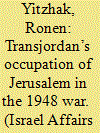

|
|
|
|
|
| Summary/Abstract |
This article describes the road to Transjordan’s occupation of Jerusalem during the 1948 Palestine war. While King Abdullah wanted to invade and occupy the city as part of his grand political ambitions, his British military chief-of-staff, Glubb Pasha, objected to this move due to his fear that Transjordan’s army (the Arab Legion) was not up to the task and that the occupation of Jerusalem, internationalised by the November 1947 UN partition resolution, would spark international outrage. Indeed, London responded to the move by joining the UN arms embargo and suspending military aid to Transjordan. This led to the kingdom’s effective departure from the war with Israel in July 1948, only two months after it had begun.
|
|
|
|
|
|
|
|
|
|
|
|
|
|
|
|
| 7 |
ID:
103227
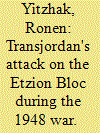

|
|
|
|
|
| Publication |
2011.
|
| Summary/Abstract |
The assault by Transjordan's Arab Legion on the Etzion Bloc (Gush Etzion), a cluster of Jewish villages north of the Biblical town of Hebron, from 4-14 May 1948, before the termination of the British Mandate, constituted an important milestone in the overall Arab strategy to prevent the emergence of the independent state of Israel in accordance with the UN Partition Resolution of 29 November 1947. The timing and manner of the attack were not coincidental but indicative of King Abdullah's political and military ambitions. They also tell of the reality of mandatory policy, as it was Britain that armed, trained, and led the Legion, and was obliged to protect the Jewish villages. In theory, the Etzion Bloc, like other Jewish neighbourhoods in the prospective Arab state, should have been able to live and prosper in peace. As it were, all were destroyed and their inhabitants expelled, in this case - after a large scale massacre of surrendered fighters.
|
|
|
|
|
|
|
|
|
|
|
|
|
|
|
|
| 8 |
ID:
178534
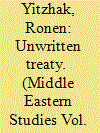

|
|
|
| 9 |
ID:
145309


|
|
|
|
|
| Summary/Abstract |
Since its establishment in 1921, the Jordanian Hashemite regime has endured uprisings and coup attempts from Jordanians, Palestinians, and foreigners. Jordanian intelligence, which has played a significant role in maintaining the stability of the Hashemite kingdom, is considered one of the most effective intelligence agencies in the world. According to Los Angeles Times correspondent Ken Silverstein, it has surpassed Israel's Mossad as America's most effective allied counter-terrorism agency in the Middle East.
|
|
|
|
|
|
|
|
|
|
|
|
|
|
|
|
|
|
|
|
|